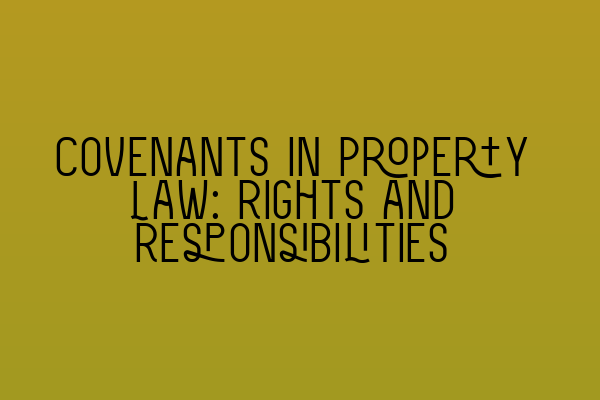Covenants in Property Law: Rights and Responsibilities
Welcome to SQE Property Law & Land Law, where we specialize in providing expert legal advice and guidance on all matters related to property law. In this blog post, we will delve into the concept of covenants in property law, exploring the rights and responsibilities that they entail.
What are Covenants?
In property law, covenants are legally binding agreements that impose certain rights and obligations on property owners. These agreements are typically contained within the title deeds of a property and restrict or regulate the use of the land or property. Covenants serve to protect the interests of both the property owner and the wider community.
There are two main types of covenants:
- Positive Covenants: These are obligations to do something specific, such as maintaining a garden or contributing to the upkeep of communal areas in a housing estate.
- Negative Covenants: These are restrictions on certain activities, such as prohibiting the construction of additional structures or restricting the use of the property for certain purposes.
Rights and Responsibilities of Covenants
When entering into a covenant, it is important to understand the rights and responsibilities that come with it. Here are some key points to consider:
1. Enforceability
Covenants are binding on both the original parties who entered into the agreement and any subsequent owners of the property. This means that if you purchase a property with existing covenants, you are also bound by those covenants.
It is crucial to conduct thorough due diligence when buying a property to ensure that you are aware of any covenants that may affect your rights and responsibilities as the owner.
Related article: Misrepresentation in Contracts: Unveiling Deceptive Practices
2. Breach of Covenant
If a property owner fails to comply with a covenant, they may be considered to be in breach of the agreement. In such cases, the affected party has the right to take legal action to enforce the covenant and seek appropriate remedies.
It is important to seek legal advice if you believe that a covenant has been breached or if you are accused of breaching a covenant. A solicitor specializing in property law can assess the situation and provide guidance on how to proceed.
3. Modification and Release
In some cases, it may be possible to modify or release a covenant. This usually requires the agreement of all parties involved and, in some cases, an application to the relevant authorities or a court. Seeking professional legal advice is essential when considering the modification or release of a covenant.
4. Community Impact
Covenants often aim to protect the interests of the wider community and maintain the value and integrity of a particular area. They can help regulate the use of shared spaces, ensure the preservation of architectural features, and prevent activities that may have a negative impact on the community.
If you are considering entering into a covenant, it is crucial to understand its potential impact on the surrounding community. It is also vital to respect and abide by the covenants set by previous property owners to maintain harmonious coexistence.
Conclusion
Covenants play a crucial role in property law, safeguarding the rights and responsibilities of property owners and ensuring the maintenance of communities. Understanding the enforceability, breach, modification, and community impact of covenants is essential for all property owners.
If you require legal advice or assistance regarding covenants or any other property law matters, our team at SQE Property Law & Land Law is equipped to provide expert guidance.
Related Articles:
